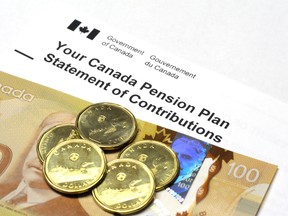Starting CPP at age 60 versus age 70 does not necessarily need to impact whether you continue to work or not, expert says
Reviews and recommendations are unbiased and products are independently selected. Postmedia may earn an affiliate commission from purchases made through links on this page.
Article content
By Julie Cazzin with Andrew Dobson
Q: I am single, 59 and rent a nice two-bedroom apartment. I have about $400,000 in a registered retirement savings plan (RRSP). Even though I have worked for the past 30 years, I have not made maximum contributions to the Canada Pension Plan (CPP) over my lifetime. I’ve likely made closer to two-thirds of the maximum CPP contribution annually. Does it still make good financial sense to delay my CPP until I am 70? If I do delay it, I will have to continue working part time, which is fine, but I would prefer not to if I can help it. — Elise
Advertisement 2
Article content
FP Answers: How much you have contributed to CPP in the past only has a small impact when considering the ideal timing of the pension, Elise. Your life expectancy, investment risk tolerance and how badly you need the cash flow are important considerations. But let’s start by considering how your CPP is calculated.
The amount you receive from CPP is primarily based on two factors: your past contributions and when you start the pension. If you defer your CPP, have less than the maximum contribution and have years with low or no earnings prior to age 65, that will reduce your CPP entitlement. However, the amount that your pension increases for deferring it is more than the reduction you would receive for not contributing further.
To maximize CPP, you generally need to have contributed the maximum to the CPP for 39 years. The calculation is based on your contributions between ages 18 and 65, which equals 47 years. There is a dropout feature that allows pensioners to exclude eight years from the calculation.
If you retire now and defer the pension, there are six years with no contributions up to age 65. Each zero-income year would reduce your CPP entitlement by about 2.6 per cent. But CPP always increases if you start it later, on the basis that you will receive fewer months of payments over the rest of your life. This increase is 7.2 per cent between 60 and 65 and 8.4 per cent between 65 and 70.
Article content
Advertisement 3
Article content
As a result, deferring after age 60 and having zero-income years results in a small reduction for not contributing, but a larger increase for deferring. That means a net increase in your pension even if you are not working.
In your case, if you continue to work and make CPP contributions, it may make sense to defer the pension until you are fully retired rather than take the pension while making contributions. If you started CPP and were still working, you would still need to make contributions until at least age 65. Those contributions would increase your pension in the subsequent year.
But starting CPP at age 60 versus age 70 does not necessarily need to impact whether you continue to work or not, Elise. You could, for example, retire and take RRSP withdrawals to supplement your cash flow, deferring your CPP as late as age 70. You would be tapping into your RRSP early in retirement and allowing your CPP to grow instead.
That decision should be based on whether you can afford to retire, which is something you could explore with a professional retirement planner if you are unsure.
Advertisement 4
Article content
A key factor that should be considered when deciding on CPP timing is life expectancy. If you defer CPP to receive more in the future, there is a break-even point that you would need to live to in order to be better off for having waited.
If you expect to live into your early to mid-80s, that is generally where the breakeven point for CPP would be when deciding to take the pension at 65 versus deferring. So, it would take more than 10 years to make up for the pension being deferred for five years from age 65 to 70.
The other reason to take CPP early could be if you expect to have high returns in your RRSP. If you need to decide between withdrawing from your RRSP or starting your CPP early in retirement, strong RRSP performance could make up for the lower CPP payments for taking it early.
There are other factors to consider, such as your cash-flow needs, whether you have debt, your tax situation and estate considerations.
Some people want to start their CPP as early as possible because they think waiting always makes you worse off. That is simply not the case. There are instances where deferring can be beneficial and allow you to spend more and leave a larger estate.
Advertisement 5
Article content
Recommended from Editorial
-

What to do with the money in a locked-in retirement account
-

How do I set up a trust to distribute earnings to my grandchildren?
But I’d start with whether you can afford to retire now or not with your existing RRSP assets and CPP entitlement, Elise. If you continue to work, do so because you need to or want to, and not simply because you want to defer your CPP.
Andrew Dobson is a fee-only, advice-only certified financial planner (CFP) and chartered investment manager (CIM) at Objective Financial Partners Inc. in London, Ont. He does not sell any financial products whatsoever. He can be reached at adobson@objectivecfp.com.
Bookmark our website and support our journalism: Don’t miss the business news you need to know — add financialpost.com to your bookmarks and sign up for our newsletters here.
Article content























Discussion about this post